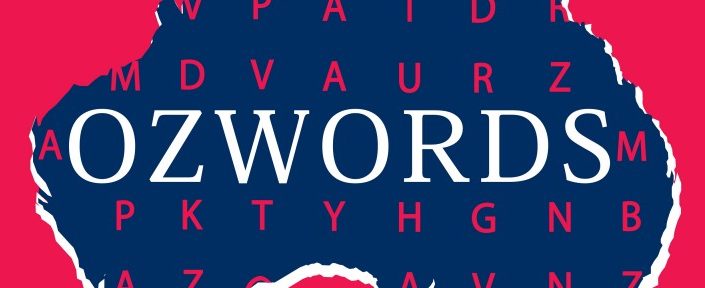By Julia Robinson, editor and researcher at the Australian National Dictionary Centre
The ANDC reading program is an essential resource for identifying new Australian words and meanings for our archive of Australian English. We draw on this archive to create new entries for all our dictionaries, but especially the historically-based Australian National Dictionary. This dictionary shows the life history of each word through illustrative quotations across time, so gathering quotation evidence is a core task in creating an entry.
The reading program has two functions: it alerts us to possible new Australian words and meanings, and it provides quotation evidence for constructing entries.
The reading program is an evolving list of books, magazines, periodicals, and other recent works we think will reflect current Australian usage. We read across a broad range of Australian publications, keeping a close eye on book reviews and publishing websites to see what’s new. We prefer to read in hardcopy and make good use of library services.
Each reader at the centre has a favourite genre (such as crime fiction, musical biography, political memoir), so when new books arrive we often know who will put their hand up for a particular work.
I am sometimes asked what specific words I am looking for in a particular book. The answer is ‘I’ll take anything I can find’. What I really want to find are unfamiliar word and meanings. In a book about migrant experience, I hope to find examples of migrant English. In a sporting biography, I hope to find new sporting terms. But in either book I will also find words or phrases unrelated to the subject: a new use of bogan, perhaps, or new evidence for kangatarian or pot and parma. We cast a wide net to gather in as much as we can.
At present we are finding that memoir is a productive genre and, luckily for us, memoir is having a moment. Bookshop displays are groaning with autobiographical works by athletes, media personalities, politicians, musicians, and other local and national identities. Of special interest are the writers whose literary voice has a regional or local accent, because we are always keen to expand our knowledge of Australian regionalisms. We look for works with the author’s own style, vocabulary, and syntax.
From the autobiographical works we’ve read this year, here is a small selection of the authors we found especially useful, and examples of the terms we collected.
Media personality Tracey Spicer’s exuberant style gave us idioms such as off like grandma’s pants on payday, up and down like stripper’s knickers, and porch over the pubes (a post-labour paunch). Richie Vaculik, Bra Boy and MMA fighter, gave us typewriter and gearstick (terms for rough physical pranks perpetrated by teens on younger kids), and micro-grom (a very young surfer). Top End musician Seaman Dan gave us ailan blues (blues played Torres Strait Island-style) and Torres Strait hula (a dance style).
Cup-winning jockey Michelle Payne alerted us to green whistle (a handheld pain relief device), and no carrots (of a horse in a race, no gas in the tank). Author Michael Mohammed Ahmad, in a novel based on his experience growing up in a Muslim community, gave us shu cuz (a greeting), and the similes poor as kebabs and more Aussie than beetroot. Kings Cross identity John Ibrahim gave us bridge up (to arc up for a fight) and box visit (a non-contact prison visit). Tasmanian author Rachael Treasure gave us nutty as a Picnic bar (crazy) and schnozzled (drunk).
Politicians past and present have been busy. Jacqui Lambie gave us chirpie (a drink) and hug doctor (a person who is comfortable giving sympathetic hugs). We liked Anne Aly’s euphemism what the felafel. Sam Dastyari gave us further evidence for halal snack pack (kebab meat topped with chips and sauces). Gareth Evans gave us silly-shirts photo-call (official group photo of APEC leaders) and tick-and-flick (describing the routine approval of an agenda item). Craig Emerson gave us cracker gun (a ‘toy’ made by inventive kids when fireworks were legal).
This is a small selection of the rich mix of terms we are collecting through our reading. A year ago I reported in Ozwords that, in the year since the publication of the second edition of the Australian National Dictionary, we had a list of 300 possible new dictionary entries. Thanks to stepping up our reading program, we now have a list of some 2000 words and phrases that may be Australian in origin or usage. Further research is needed to determine this.
We welcome suggestions for our reading list. If there’s a recent Australian book you think we should read, especially one with a local or regional focus—or one that is more Aussie than beetroot—please email us at [email protected]
Find out more about the Australian National Dictionary Centre.

Leave a Reply